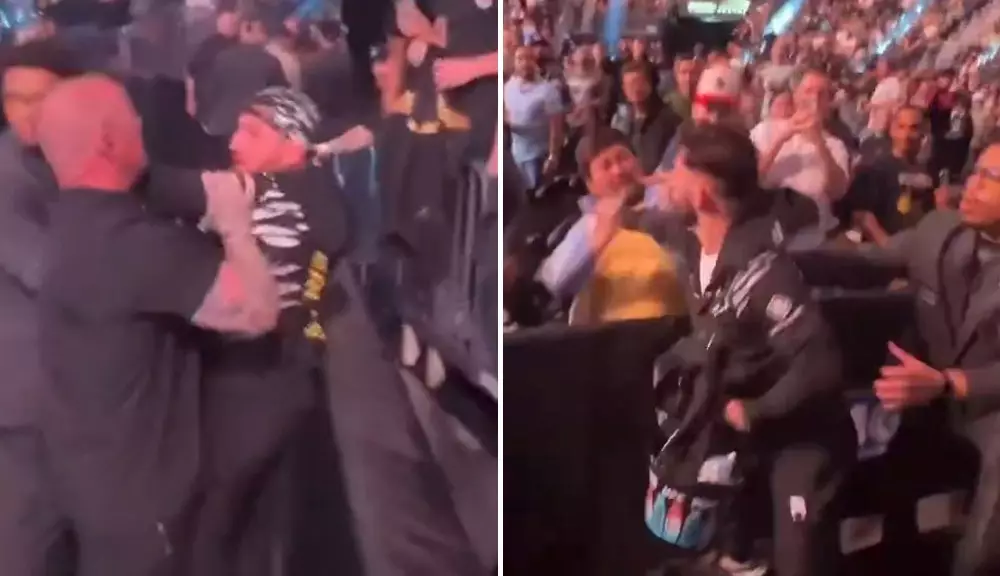The world of mixed martial arts (MMA) is not only defined by the competitions within the cage; it also extends to the conduct and responsibilities of fighters outside of it. A recent incident featuring UFC fighter Dennis Buzukja highlights the volatility of fighter conduct and the potential ramifications of altercations that spill into the public domain. Following an altercation at a December event, the Nevada Athletic Commission (NAC) has taken decisive action by suspending Buzukja for nine months and imposing a monetary fine. This article scrutinizes the details surrounding the event, the commission’s response, and the broader implications for the sport.
The fracas involving Buzukja occurred during a significant UFC event held at the T-Mobile Arena. Reports indicate that Buzukja, alongside teammate Merab Dvalishvili, engaged in a physical confrontation with a spectator identified as Arman Tugaev. Tugaev is linked to the Nurmagomedov camp, a known rival to Dvalishvili, which raises questions about premeditated provocations in close-knit MMA circles. The altercation culminated in Buzukja throwing punches at Tugaev, a scenario that not only jeopardized the safety of individuals involved but also threatened the integrity of the event itself.
Promptly addressing the situation, the NAC convened to review the incident. Their decision to suspend Buzukja for nine months and impose a fine of $2,500, along with additional legal fees, signifies an unyielding stance against violence. Notably, Buzukja may reduce his suspension to six months if he successfully fulfills a community service requirement, which they hope will instill a sense of accountability and redemption following such a public embarrassment.
The alternative to a longer suspension not only aims to rehabilitate Buzukja’s image but also reinforces a standard of expected conduct among fighters. He has been mandated to complete 40 hours of community service at reputable organizations, including Big Brothers Big Sisters and Special Olympics. This approach speaks to a broader ethos within the combat sports community: the belief that fighters are role models and must, therefore, act with decorum and responsibility.
Commissioner Alexander Chen articulated the NAC’s intent to uphold both the safety of fighters and fans during their deliberations. His comments underscored a culture of zero tolerance for aggressive behavior that can translate into danger at public events. The commission’s proactive measures could serve as a precedent for handling similar incidents, showcasing a commitment to maintaining the industry’s values and assuring spectators of a safe environment at events.
The UFC and the governing bodies that oversee it have long struggled with managing fighter conduct outside the octagon. Buzukja’s situation adds to an ongoing conversation about athlete behavior and the responsibility fighters have not only to themselves but to their fans and the sport. Chairman Dallas Haun remarked on the necessity for the NAC to reassess how such incidents are judged going forward, hinting at potential modifications to the penalties imposed on fighters who engage in violent altercations.
Athletic commissions occupy a delicate position in enforcing regulations while fostering a thriving sports environment. Their reactions, such as in the case of Buzukja, signal an intention to crack down on discouraging behavior while simultaneously providing a pathway for rehabilitation. Striking this balance remains critical as MMA continues to grow in popularity and visibility.
As the landscape of mixed martial arts evolves, the response to incidents involving fighters must also adapt. The implications of Buzukja’s situation point to a critical juncture for the sport. The NAC’s decision to impose sanctions may set a tone for increased scrutiny of fighter behavior, calling on all involved – from athletes to sponsors and organizations – to prioritize safety and decorum.
Dennis Buzukja’s punishment not only serves as a personal cautionary tale but also highlights an urgent need for a reassessment of conduct within the sport. The framework laid out by the NAC can potentially serve as a model for how to navigate the complex dynamics between athlete behavior, public safety, and community responsibility in the future. As the UFC moves forward, it must clearly uphold an image of professionalism, both inside and outside the cage.

